Daily Vocabulary Words: List of Daily Used Words in Leading Indian Newspapers
Hi there. Welcome to this special section @ Wordpandit. Our endeavour here is straightforward: highlighting daily vocabulary words that you would come across in leading newspapers in the country. We have included the following newspapers in our selection:
• The Times of India
• The Economic Times
• Hindustan Times
• Mint
• Indian Express
We are putting in extensive work to develop your vocabulary. All you have to do is be regular with this section and check out this post daily. This is your repository of commonly used words; essentially, we are posting a list of daily used words. Hence, this has significant practical application as it teaches you words that are commonly used in leading publications mentioned above.
Visit the website daily to learn words from leading Indian newspapers.
WORD-1: Feasible
CONTEXT: it should be feasible in the real-life conditions and time available.
SOURCE: Indian Express
EXPLANATORY PARAGRAPH: Imagine you want to build a really big castle out of your blocks. If you have enough blocks and time, building the castle is ‘feasible’. It means something can be done and it makes sense to try.
MEANING: Possible to do easily or conveniently (adjective).
PRONUNCIATION: FEE-zuh-buhl
SYNONYMS: Practical, Possible, Doable, Achievable, Realistic
USAGE EXAMPLES:
1. It’s feasible to finish the project by Friday.
2. They discussed feasible solutions to the problem.
3. The plan seems feasible and effective.
4. A trip to the moon is now feasible for civilians.
WORD-2: Enumeration
CONTEXT: Apply these to the caste census and you know why such enumeration is not just permissible, but essential.
SOURCE: Indian Express
EXPLANATORY PARAGRAPH: When you count your toys one by one, that’s like ‘enumeration’. It’s a fancy word for counting or listing things.
MEANING: The action of mentioning a number of things one by one (noun).
PRONUNCIATION: ih-noo-muh-RAY-shun
SYNONYMS: Listing, Counting, Cataloging, Itemization, Tallying
USAGE EXAMPLES:
1. The report included an enumeration of all the items.
2. He made an enumeration of the main points.
3. Enumeration in the survey was thorough.
4. The document required the enumeration of all assets.
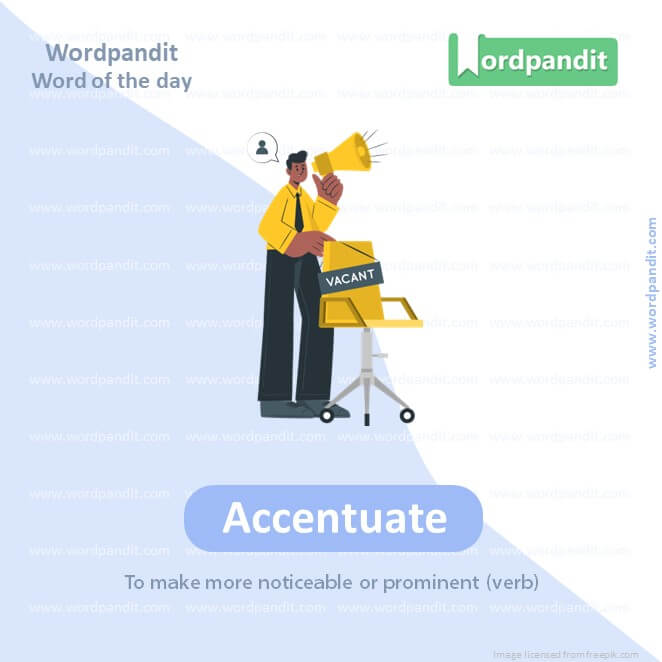
WORD-3: Accentuate
CONTEXT: Caste census could accentuate caste consciousness and caste cleavages.
SOURCE: Indian Express
EXPLANATORY PARAGRAPH: When you draw a picture and color some parts really brightly to make them stand out, that’s ‘accentuate’. It means making something more noticeable or prominent.
MEANING: To make more noticeable or prominent (verb).
PRONUNCIATION: ak-SEN-choo-ate
SYNONYMS: Highlight, Emphasize, Underline, Stress, Illuminate
USAGE EXAMPLES:
1. She wore a scarf to accentuate her outfit.
2. His speech accentuated the need for change.
3. The lighting accentuated the painting’s colors.
4. The design accentuates the building’s modernity.
WORD-4: Exorbitant
CONTEXT: We don’t discuss the doctor’s motives in prescribing an X-ray, unless we know for sure that it is unnecessary and exorbitant.
SOURCE: Indian Express
EXPLANATORY PARAGRAPH: Imagine a toy that costs as much as a car. That toy is ‘exorbitant’. It means something costs way too much.
MEANING: Exceeding the bounds of custom, propriety, or reason, especially in amount or extent; highly excessive (adjective).
PRONUNCIATION: ig-ZOR-bi-tuhnt
SYNONYMS: Excessive, Outrageous, Extortionate, Steep, Overpriced
USAGE EXAMPLES:
1. The hotel charges exorbitant prices.
2. Some people pay exorbitant amounts for rare collectibles.
3. The demand led to exorbitant costs for basic goods.
4. The city is known for its exorbitant rent prices.
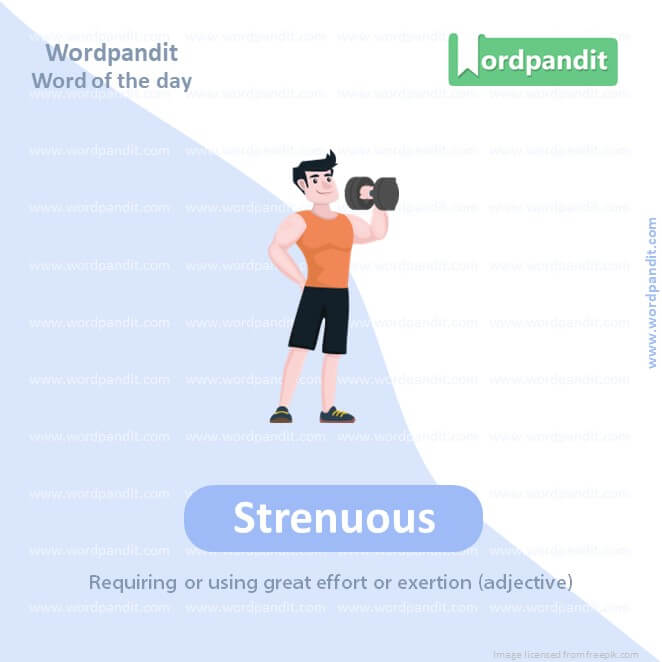
WORD-5: Strenuous
CONTEXT: A five-year assessment of the country’s national clean air programme (NCAP) reveals that strenuous efforts are needed to provide meaningful and lasting gains.
SOURCE: Hindustan Times
EXPLANATORY PARAGRAPH: Think of trying to lift something really heavy. It takes a lot of effort and makes you really tired. That’s ‘strenuous’. It means something requires a lot of energy and hard work.
MEANING: Requiring or using great effort or exertion (adjective).
PRONUNCIATION: STREN-yoo-us
SYNONYMS: Arduous, Laborious, Intense, Grueling, Taxing
USAGE EXAMPLES:
1. Climbing the mountain was a strenuous task.
2. He avoided strenuous activities after his surgery.
3. The workout was strenuous but rewarding.
4. The job requires strenuous effort daily.
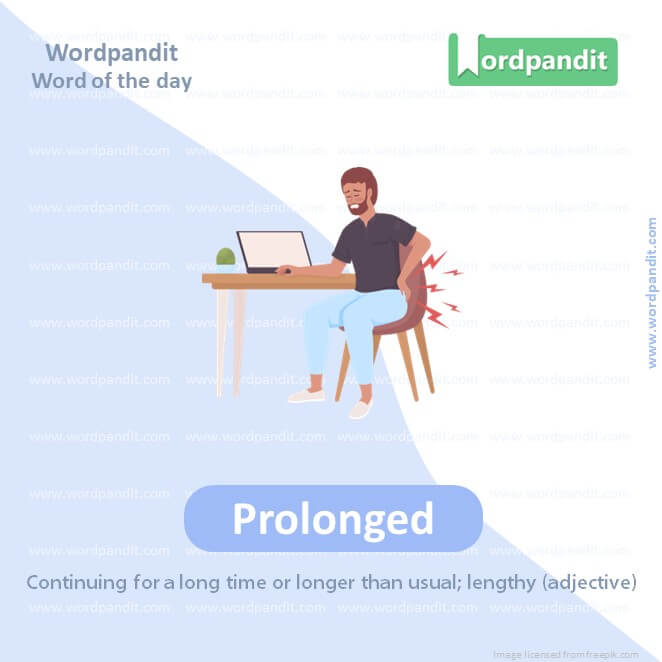
WORD-6: Prolonged
CONTEXT: PM2.5 can even cross the blood-brain barrier and be fatal under prolonged exposure.
SOURCE: Hindustan Times
EXPLANATORY PARAGRAPH: Imagine your bedtime story going on and on for a really long time. That’s ‘prolonged’. It means something that lasts for a long time or is made to last longer.
MEANING: Continuing for a long time or longer than usual; lengthy (adjective).
PRONUNCIATION: pro-LONGD
SYNONYMS: Extended, Lengthy, Protracted, Drawn-out, Long-drawn
USAGE EXAMPLES:
1. The drought resulted in a prolonged dry spell.
2. He experienced prolonged periods of happiness.
3. The prolonged use of the device drained its battery.
4. Prolonged exposure to the sun can be harmful.
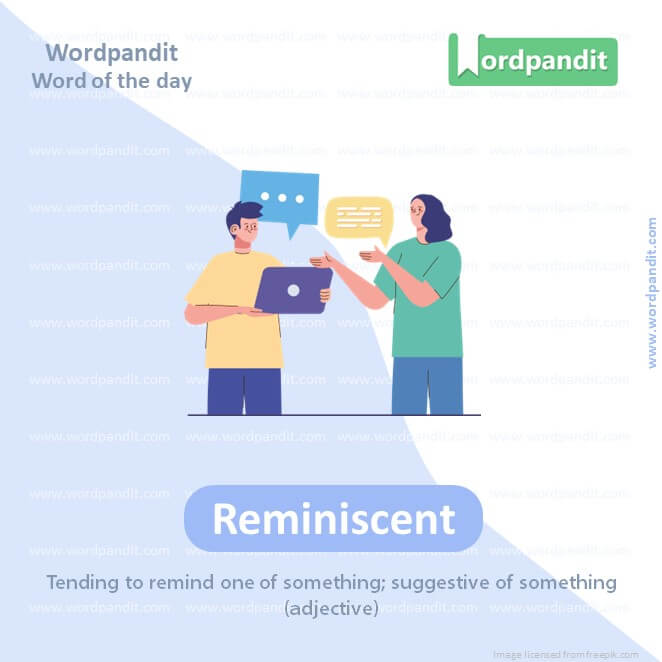
WORD-7: Reminiscent
CONTEXT: The atmosphere there was reminiscent of the day before a wedding.
SOURCE: Hindustan Times
EXPLANATORY PARAGRAPH: When something makes you think of a fun day you had before, like a smell or a song, that’s ‘reminiscent’. It means reminding you of something.
MEANING: Tending to remind one of something; suggestive of something (adjective).
PRONUNCIATION: rem-uh-NIS-uhnt
SYNONYMS: Suggestive, Evocative, Reminding, Recalling, Nostalgic
USAGE EXAMPLES:
1. The music was reminiscent of her childhood.
2. The style is reminiscent of the 1920s.
3. He told stories reminiscent of his adventures.
4. The fragrance was reminiscent of spring flowers.
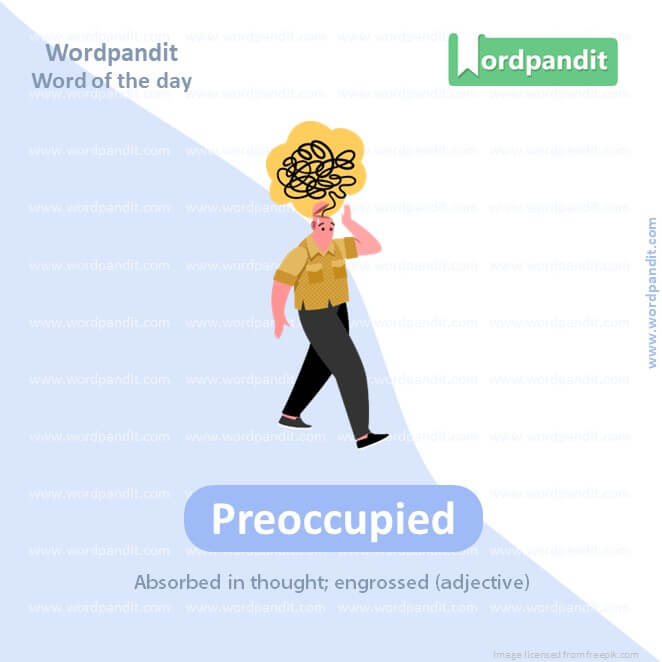
WORD-8: Preoccupied
CONTEXT: Half a day has passed in Ayodhya, and upon my return, it is evident that the city is preoccupied with finding its place in this celebratory atmosphere.
SOURCE: Hindustan Times
EXPLANATORY PARAGRAPH: When you are thinking so much about something like a puzzle or a game, and you don’t notice anything else, you’re ‘preoccupied’. It means your mind is really busy with something.
MEANING: Absorbed in thought; engrossed (adjective).
PRONUNCIATION: pree-OK-yuh-pied
SYNONYMS: Engrossed, Absorbed, Distracted, Occupied, Busy
USAGE EXAMPLES:
1. She was too preoccupied with her work to notice.
2. He walked past them, preoccupied with his thoughts.
3. The preoccupied teacher didn’t hear the bell ring.
4. They were preoccupied with planning the event.
WORD-9: Insurgent
CONTEXT: How else would one explain their willingness to transition from being insurgent leaders to advocates of development.
SOURCE: Hindustan Times
EXPLANATORY PARAGRAPH: Imagine a group of people in a story who stand up and fight against the leaders because they want change. These people are ‘insurgents’. It means they are fighting against the people in charge, often in a struggle for power.
MEANING: A person who revolts against authority, a government, or a ruler, often in a struggle for power (noun).
PRONUNCIATION: in-SUR-jent
SYNONYMS: Rebel, Revolutionary, Mutineer, Dissident, Revolter
USAGE EXAMPLES:
1. The government troops fought against the insurgents.
2. The insurgents were demanding political reforms.
3. He wrote a book about his time as an insurgent.
4. Insurgent activities increased in the region.
WORD-10: Envisaged
CONTEXT: I witnessed how the Women Entrepreneurship Platform envisaged leveraging AI to provide women with personalized suggestions on the most relevant government schemes and increasing uptake and access in the public sphere.
SOURCE: Hindustan Times
EXPLANATORY PARAGRAPH: When you close your eyes and imagine you’re a superhero flying in the sky, that’s ‘envisaging’. It means forming a picture in your mind about what something could be like.
MEANING: To form a mental picture of something; to imagine or expect something in the future, especially something that is not yet real (verb).
PRONUNCIATION: en-VIZ-ijd
SYNONYMS: Imagine, Conceive, Visualize, Picture, Foresee
USAGE EXAMPLES:
1. She envisaged a new kind of school for creative learning.
2. They envisaged a trip around the world.
3. The policy was not envisaged to have such effects.
4. He envisaged a bright future in the new city.
Vocabulary Exercises
In the language learning fitness regime, ‘vocabulary exercises’ are vital workouts that flex cognitive muscles. These exercises help reinforce new vocabulary, enhance memory, and promote active application. However, to reap the full benefits of ‘vocabulary exercises’, it’s crucial to tackle them with the right strategy and mindset.
To begin with, when approaching ‘vocabulary exercises’, it’s important to view them as opportunities to explore words’ usage. Completing these exercises isn’t simply about ticking off correct answers; it’s about deepening the understanding of the words in various contexts which aids in their active usage.
Leveraging technology can greatly enhance the efficiency of ‘vocabulary exercises’. Digital apps often provide a wide range of ‘vocabulary exercises’ that range from fill-in-the-blank exercises to match-the-column tasks. These digital platforms offer instant feedback and keep you engaged while turning learning into an interactive experience.
Incorporating ‘vocabulary exercises’ in your daily learning routine helps consolidate your vocabulary knowledge. Set aside specific time slots every day to commit to these exercises. Regular revisions steps up retention and keep the learning curve ascending.
Personalizing ‘vocabulary exercises’ also proves beneficial. This could involve creating your own sentences using the learnt vocabulary or drawing visuals that associate with each word. These personalized exercises stimulate more profound learning and enhance the recall ability.
To conclude, ‘vocabulary exercises’ are essential tools in your language learning toolkit. They provide a platform for active learning, promote better recall, and, when paired with technological tools, make learning more engaging and effective. Furthermore, incorporating these exercises into your daily routine and personalizing them heightens their impact. Remember, ‘vocabulary exercises’ are not merely tasks, they are stepping stones guiding you towards your language mastery goals.













